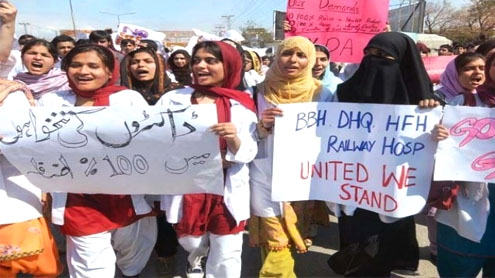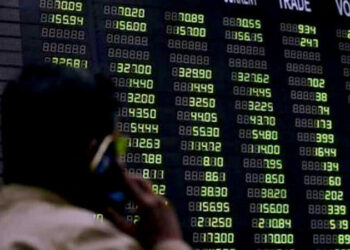 The Punjab government’s mishandling of the strike by young doctors is threatening to bring the entire country’s health system to a halt. The doctors’ strike that started from Mayo Hospital in Lahore to demand better remuneration commensurate with their qualification and experience spread to the rest of Punjab. After the failure of the Punjab government’s belated negotiations with the Young Doctors Association (YDA), doctors in Sindh and Balochistan have also indicated they would go on a strike in solidarity with their colleagues in Punjab and to demand a uniform pay package for doctors across the country. It is only a matter of time before doctors in Khyber Pakhtunkhwa make a similar decision.
The Punjab government’s mishandling of the strike by young doctors is threatening to bring the entire country’s health system to a halt. The doctors’ strike that started from Mayo Hospital in Lahore to demand better remuneration commensurate with their qualification and experience spread to the rest of Punjab. After the failure of the Punjab government’s belated negotiations with the Young Doctors Association (YDA), doctors in Sindh and Balochistan have also indicated they would go on a strike in solidarity with their colleagues in Punjab and to demand a uniform pay package for doctors across the country. It is only a matter of time before doctors in Khyber Pakhtunkhwa make a similar decision.
If the Punjab government thinks that by demonising protesting doctors as playing with the lives of people, dismissing them from service and replacing them with new recruits it can solve this issue, it is grossly mistaken. In Rawalpindi, 23 newly appointed doctors have refused to join duty and tendered their resignations in solidarity with their protesting colleagues. On the other hand, the Medical Teachers Association’s Punjab chapter has held consultation meetings and announced their support for the YDA. Senior doctors have condemned the intransigence and bureaucratic attitude of the Punjab government and threatened to withdraw their services if it did not implement the pay raise it had announced on March 31. The provincial government had later said that this raise would be implemented in the form of the Rs 3,000 annual increase in the doctors’ monthly salaries. Senior doctors also observed that new inductees do not have the requisite training and qualification to be able to run the system. Giving such responsibilities in the hands of young doctors might prove counter-productive and in fact risk the health of patients. It can be argued that the sufferings of the people, in whose name the Punjab government is playing havoc with the health system, are likely to increase because of the Punjab government’s shortsighted policies.
Doctors are highly qualified personnel and the number of their working hours far exceeds those of other professions. Getting admission to a medical college is a highly competitive and rigorous process. A doctor spends an average of six years after Intermediate to quality for a bachelor’s degree in medicine and surgery. House officers are offered from Rs12,000-18,000 monthly salary in different provinces. Medical officers/resident post-graduate trainees are offered 22,000 for the five or more years of their training. In comparison, personnel of other services are getting far better remuneration. To offer a meagre wage and expect the doctors to serve as a moral obligation is completely unrealistic. Doctors are assets of society, who have shown remarkable service in times of emergency. Admitted that in the public sector they cannot expect the kind of remuneration possible in the private sector or through private practice, but the government should at least offer a living wage to doctors.
It would have been most appropriate if the Punjab government had given a sympathetic hearing to the doctors’ demands when they were put forward one year ago and negotiated amiably. The attitude of indifference compelled the doctors to think there was no choice left other than to take industrial action. What is worse, the Punjab government does not realise its mistake and refuses to reconsider its position. Invoking morality to condemn doctors does not reflect the ground realities or concern for their situation. Now that the problem has assumed a national scale, it is imperative that the federal government intervene and resolve this issue. The government should invite the apex bodies of senior and young doctors as well as the Punjab government to the table and try to find an amicable solution. The government must give whatever incentives are possible, so that normalcy could be restored in the health sector. – Dailytimes












